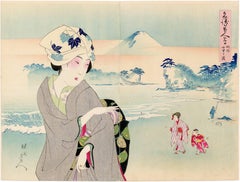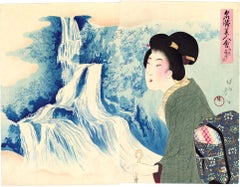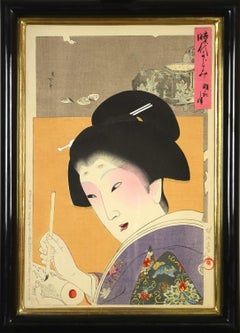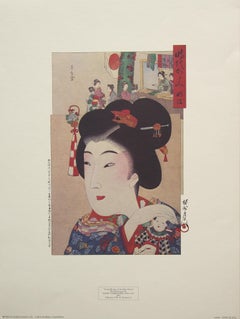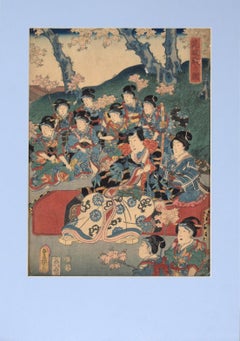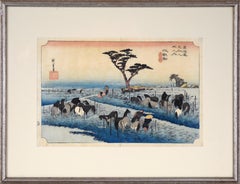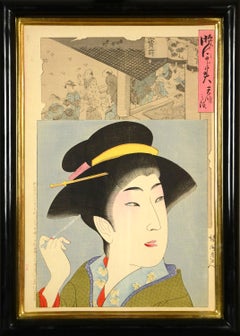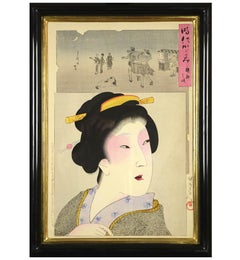CHIKANOBU, Yoshu Prints and Multiples
to
2
1
3
Overall Width
to
Overall Height
to
4
1,330
988
773
756
3
1
2
2
4
3
3
3
3
1
1
1
1
1
1
2
2
2
2
1
1
3
1
Artist: CHIKANOBU, Yoshu
Beauties on the Beach with view of Mount Fuji
By Yoshu Chikanobu
Located in Burbank, CA
Shichirigahama, Sagami Province. A beauty in the foreground waves to her young companions, who run towards her on the beach. The beauty at left wears a western-style golden ring. We ...
Category
1890s Edo CHIKANOBU, Yoshu Prints and Multiples
Materials
Handmade Paper, Mulberry Paper, Woodcut
Japanese Beauty Admiring Kirifuri Waterfall
By Yoshu Chikanobu
Located in Burbank, CA
A beauty turns to admire the Kirifuri Waterfall in Nikko Province. She holds the handle of an umbrella and wears fashionable clothing that is beautifully printed. This series pairs f...
Category
1890s Edo CHIKANOBU, Yoshu Prints and Multiples
Materials
Mulberry Paper, Handmade Paper, Woodcut
A Set of Six Bust Portraits of Beauties - Jidai Kagami (Mirror of the Ages).
By Yoshu Chikanobu
Located in London, GB
CHIKANOBU, Yoshu (1838–1912)
A Set of Six Bust Portraits of Beauties - Jidai Kagami (Mirror of the Ages).
1896-1898
A Set of Six oban tate-e woodblock prints of okubi-e (bust portraits) of beauties, titled Jidai kagami (Mirror of the Ages), documenting the fashions of former times (from the Keicho to the Meiji era) in chronological order, each sheet with a beautiful woman in sumptuous costume depicted at the lower section and a rectangular panel at the top which makes a reference to the era, some sheets with lacquer and embossed details, published by Matsuki Heikichi, variously dated Meiji 29, 30 and 31 (1896-8), all signed Yoshu Chikanobu. Each sheet approx. 36 x 23.7 cm (14 1/8 x 9 3/8 in).
oyohara Chikanobu (1838–1912), better known to his contemporaries as Yōshū Chikanobu, was one of the most successful woodblock print artists of Japan's Meiji period. He lived at a time when Japan saw the reinstatement of the emperor as ruler and underwent rapid westernization. He worked both with traditional subjects, such as actors, courtesans, scenes of famous sites, beautiful women, and with topical subjects, such as the Satsuma Rebellion (1877) and the Sino-Japanese War (1894-1895). Chikanobu used the flat planes and decorative patterning of the ukiyo-e tradition to striking effect, adding brilliant colors, especially reds, purples, and blues to his compositions.
More precisely, Ukiyo-e, or ukiyo-ye (in Japanese: "pictures of the floating world"), is a genre of woodblock prints and paintings that flourished in Japan from the 17th through 19th centuries. It was aimed at the prosperous merchant class in the urbanizing Edo period (1603–1867). Amongst the popular themes were depictions of beautiful women, as is the case here with these okubi-e prints (i.e. bust portraits); kabuki actors and sumo wrestlers; scenes from history and folk tales; travel scenes and landscapes; flora and fauna; and erotica.
One of Chikanobu’s best series, A Mirror of the Ages shows women by fashion and hair style throughout history. Despite a sense of longing for the past, these prints are unmistakably modern and of their time. Each print depicts a beauty from a certain period in the lower part and customs at that time, in grisaille, in the upper part - a way to tell viewers about the latest fashion and historical backgroud at that time. The quality of printing is outstanding, especially in Chikanobu’s use of white for the rendering of the powdered faces. Indeed, Chikanobu was known as a master of bijinga (images of beautiful women), and for illustrating changes in women's fashion, including both traditional and Western clothing...
Category
1890s Other Art Style CHIKANOBU, Yoshu Prints and Multiples
Materials
Wood
"Young Woman of the Meiji" by Yoshu Chikanobu, Lithographic Print.
By Yoshu Chikanobu
Located in Clinton Township, MI
Published by Portal Publications.
Printed in USA
Good Condition
24 x 18
Category
20th Century CHIKANOBU, Yoshu Prints and Multiples
Materials
Lithograph
Related Items
Dueling with Cherry Blossoms - Tales of Genji - Japanese Woodblock
By Utagawa Kunisada (Toyokuni III)
Located in Soquel, CA
Dueling with Cherry Blossoms - Tales of Genji - Japanese Woodblock
Rightmost panel a triptych, depicting a group of children and a samurai watching a "duel" with cherry blossoms. Th...
Category
1850s Realist CHIKANOBU, Yoshu Prints and Multiples
Materials
Printer's Ink, Rice Paper, Woodcut
"Early Summer Horse Fair" from 53 Stations of the Tokaido
By Utagawa Hiroshige (Ando Hiroshige)
Located in Soquel, CA
"Early Summer Horse Fair" from 53 Stations of the Tokaido
Woodblock print of a group of horses, originally by Hiroshige (Ando) Utagawa (Japanese, 1797 - 1858). Several groups of hor...
Category
1830s Edo CHIKANOBU, Yoshu Prints and Multiples
Materials
Rice Paper, Woodcut
"Grave of Santa Anna's Leg" Original Woodblock Print, Signed Artist's Proof
By Carol Summers
Located in Soquel, CA
"Grave of Santa Anna's Leg" Original Woodblock Print, Signed Artist's Proof
Boldly colored woodblock print by Carol Summers (American, 1925-2016). This piece is a segment of a grave, with a headstone that has a skull and cross. There are two bright green plants flanking the headstone. Below the headstone and plants, there is a large arched blue shape, with a crescent moon and stars. A red leg, bent at the knee, cuts across the blue arch.
Signed "Carol Summers" along the right edge of the blue shape.
Numbered and titled "A/P Grave of Sant Anna's Leg" along the left edge of the blue shape.
Presented in a silver colored aluminum frame.
Frame size: 32.245"H x 27.25"W
Paper size: 29.75"H x 24.5"W
Carol Summers (1925-2016) has worked as an artist throughout the second half of the 20th century and into the first years of the next, outliving most of his mid-century modernist peers. Initially trained as a painter, Summers was drawn to color woodcuts around 1950 and it became his specialty thereafter. Over the years he has developed a process and style that is both innovative and readily recognizable. His art is known for it’s large scale, saturated fields of bold color, semi-abstract treatment of landscapes from around the world and a luminescent quality achieved through a printmaking process he invented.
In a career that has extended over half a century, Summers has hand-pulled approximately 245 woodcuts in editions that have typically run from 25 to 100 in number. His talent was both inherited and learned. Born in 1925 in Kingston, a small town in upstate New York, Summers was raised in nearby Woodstock with his older sister, Mary. His parents were both artists who had met in art school in St. Louis. During the Great Depression, when Carol was growing up, his father supported the family as a medical illustrator until he could return to painting. His mother was a watercolorist and also quite knowledgeable about the different kinds of papers used for various kinds of painting. Many years later, Summers would paint or print on thinly textured paper originally collected by his mother.
From 1948 to 1951, Carol Summers trained in the classical fine and studio arts at Bard College and at the Art Students League of New York. He studied painting with Steven Hirsh and printmaking with Louis Schanker. He admired the shapes and colors favored by early modernists Paul Klee (Sw: 1879-1940) and Matt Phillips (Am: b.1927- ). After graduating, Summers quit working as a part-time carpenter and cabinetmaker (which had supported his schooling and living expenses) to focus fulltime on art. That same year, an early abstract, Bridge No. 1 was selected for a Purchase Prize in a competition sponsored by the Brooklyn Museum.
In 1952, his work (Cathedral, Construction and Icarus) was shown the first time at the Museum of Modern Art in New York City in an exhibition of American woodcuts...
Category
1980s Contemporary CHIKANOBU, Yoshu Prints and Multiples
Materials
Ink, Handmade Paper, Woodcut
H 32.25 in W 27.25 in D 1 in
"The Two Sisters" lithograph
By (after) Henri Matisse
Located in Henderson, NV
Medium: lithograph (after the painting). Printed in Paris on smooth wove paper at the atelier Mourlot and published in 1954. Size: 6 1/2 x 8 inches (168 x 202 mm). Not signed.
Cond...
Category
1950s CHIKANOBU, Yoshu Prints and Multiples
Materials
Lithograph
Shin-machi Bridge at Hodogaya - Japanese Woodcut Print on Rice Paper
By Utagawa Hiroshige
Located in Soquel, CA
Shin-machi Bridge at Hodogaya - Japanese Woodcut Print on Rice Paper
Woodblock print of travelers on a bridge by Utagawa Hiroshige (Japanese, 1797-185...
Category
1850s Impressionist CHIKANOBU, Yoshu Prints and Multiples
Materials
Rice Paper, Woodcut
H 15.5 in W 19.25 in D 1.25 in
Kiyomi Barrier & Seiken Temple Near Okitsu- Japanese Woodcut Print on Rice Paper
By Utagawa Hiroshige
Located in Soquel, CA
Kiyomi Barrier & Seiken Temple Near Okitsu - Japanese Woodcut Print on Rice Paper
Woodblock print of boats in a harbor by Utagawa Hiroshige (Japanese, 1797-1858). Originally publish...
Category
1850s Impressionist CHIKANOBU, Yoshu Prints and Multiples
Materials
Rice Paper, Woodcut
H 15.5 in W 19.25 in D 1.25 in
Petite danseuse aux cheveux défaits, 1991, original lithograph by Jean Jansem
By Jean Jansem
Located in Les Acacias GE, GE
Jean Jansem (1920-2013)
Petite danseuse aux cheveux défaits, 1991
Lithographie sur papier Arches
Signée en bas à droite et justifiée en bas à droite
66 x 47 cm / 76 x 54 cm
Imprime...
Category
Late 20th Century Expressionist CHIKANOBU, Yoshu Prints and Multiples
Materials
Lithograph
Festival Procession Of A Daimyo - Original Woodblock Print
Located in Soquel, CA
Procession Of A Daimyo - Original Woodblock Print
Original woodblock print depicting the procession of a Daimyo. Ten Japanese soldiers are seen as they aid in transporting the Daimy...
Category
Late 18th Century Edo CHIKANOBU, Yoshu Prints and Multiples
Materials
Ink, Wood Panel, Rice Paper
"Cain and Abel" original lithograph
By Marc Chagall
Located in Henderson, NV
Medium: original lithograph. Printed by Mourlot and published in Paris by Teriade for the art revue Verve in 1960 for a special edition devoted exclusively to Chagall's original Bibl...
Category
1960s CHIKANOBU, Yoshu Prints and Multiples
Materials
Lithograph
"Jazz" lithograph poster
By (after) Henri Matisse
Located in Henderson, NV
Medium: lithograph (after the original lithograph poster). During the late 1940's and throughout the 1950's, Henri Matisse created a series of posters at the atelier of Mourlot Frere...
Category
1950s CHIKANOBU, Yoshu Prints and Multiples
Materials
Lithograph
"Enshoku Sanju-roku Kasen" (Thirty-six Enchanting Flowers) Woodblock on paper
By Toyohara Kunichika
Located in Soquel, CA
"Enshoku Sanju-roku Kasen" (Thirty-six Enchanting Flowers) Woodblock on paper
Elegant woodblock print by Toyohara Kunuchika (Japanese, 1835-1900). Three women are in talking with each other inside, while a man waits outside holding a bag of some kind. The colors in this piece are rich and saturated, primarily blues, greens, and purple.
Mat size: 16"H x 20"W
Paper size: 14.75"H x 9.88"W
Born in 1835, Toyohara Kunichika grew up in the Kyobashi district of Edo in the midst of merchants and artisans. In 1848, at age 13, he was accepted as an apprentice into the studio of Utagawa Kunisada I...
Category
1880s Edo CHIKANOBU, Yoshu Prints and Multiples
Materials
Ink, Rice Paper, Woodcut
Georgiana and Eliza (cousins of Jane Eyre)
By Fritz Eichenberg
Located in New Orleans, LA
Fritz Eichenberg did some original wood engravings for Jane Eyre. This is an image featuring Georgiana And Eliza. As children, Eliza and Georgiana Reed, alon...
Category
Late 20th Century American Modern CHIKANOBU, Yoshu Prints and Multiples
Materials
Wood, Engraving
Previously Available Items
A Group of Six Bust Portraits of Beauties - Jidai Kagami (Mirror of the Ages).
By Yoshu Chikanobu
Located in London, GB
CHIKANOBU, Yoshu (1838–1912).
A Group of Six Bust Portraits of Beauties - Jidai Kagami (Mirror of the Ages).
1896-1898
A Group of Six oban tate-e woodblock prints of okubi-e (bust portraits) of beauties, titled Jidai kagami (Mirror of the Ages), documenting the fashions of former times (from the Keicho to the Meiji era) in chronological order, each sheet with a beautiful woman in sumptuous costume depicted at the lower section and a rectangular panel at the top which makes a reference to the era, some sheets with lacquer and embossed details, published by Matsuki Heikichi, variously dated Meiji 29, 30 and 31 (1896-8), all signed Yoshu Chikanobu. Each sheet approx. 36 x 23.7 cm (14 1/8 x 9 3/8 in).
Toyohara Chikanobu (1838–1912), better known to his contemporaries as Yōshū Chikanobu, was one of the most successful woodblock print artists of Japan's Meiji period. He lived at a time when Japan saw the reinstatement of the emperor as ruler and underwent rapid westernization. He worked both with traditional subjects, such as actors, courtesans, scenes of famous sites, beautiful women, and with topical subjects, such as the Satsuma Rebellion (1877) and the Sino-Japanese War (1894-1895). Chikanobu used the flat planes and decorative patterning of the ukiyo-e tradition to striking effect, adding brilliant colors, especially reds, purples, and blues to his compositions.
More precisely, Ukiyo-e, or ukiyo-ye (in Japanese: "pictures of the floating world"), is a genre of woodblock prints and paintings that flourished in Japan from the 17th through 19th centuries. It was aimed at the prosperous merchant class in the urbanizing Edo period (1603–1867). Amongst the popular themes were depictions of beautiful women, as is the case here with these okubi-e prints (i.e. bust portraits); kabuki actors and sumo wrestlers; scenes from history and folk tales; travel scenes and landscapes; flora and fauna; and erotica.
One of Chikanobu’s best series, A Mirror of the Ages shows women by fashion and hair style throughout history. Despite a sense of longing for the past, these prints are unmistakably modern and of their time. Each print depicts a beauty from a certain period in the lower part and customs at that time, in grisaille, in the upper part - a way to tell viewers about the latest fashion and historical backgroud at that time. The quality of printing is outstanding, especially in Chikanobu’s use of white for the rendering of the powdered faces. Indeed, Chikanobu was known as a master of bijinga (images of beautiful women), and for illustrating changes in women's fashion, including both traditional and Western clothing...
Category
1890s Other Art Style CHIKANOBU, Yoshu Prints and Multiples
Materials
Wood
H 15.75 in W 11.34 in D 1.19 in
Yoshu Chikanobu, Four Bust Portraits of Beauties, woodblock prints, signed, 1896
By Yoshu Chikanobu
Located in London, GB
A Set of four oban tate-e woodblock prints of okubi-e (bust portraits) of beauties, titled Jidai kagami (Mirror of the Ages), documenting the fashions of former times (from the Keicho to the Meiji era) in chronological order, each sheet with a beautiful woman in sumptuous costume depicted at the lower section and a rectangular panel at the top which makes a reference to the era, some sheets with lacquer and embossed details, published by Matsuki Heikichi, variously dated Meiji 29, 30 and 31 (1896-8), all signed Yoshu Chikanobu. Each sheet approx. 36 x 23.7 cm (14 1/8 x 9 3/8 in), framed and glazed.
Toyohara Chikanobu (1838–1912), better known to his contemporaries as Yōshū Chikanobu, was one of the most successful woodblock print artists of Japan's Meiji period. He lived at a time when Japan saw the reinstatement of the emperor as ruler and underwent rapid westernization. He worked both with traditional subjects, such as actors, courtesans, scenes of famous sites, beautiful women, and with topical subjects, such as the Satsuma Rebellion (1877) and the Sino-Japanese War (1894-1895). Chikanobu used the flat planes and decorative patterning of the ukiyo-e tradition to striking effect, adding brilliant colours, especially reds, purples, and blues to his compositions.
More precisely, Ukiyo-e, or ukiyo-ye (in Japanese: "pictures of the floating world"), is a genre of woodblock prints and paintings that flourished in Japan from the 17th through 19th centuries. It was aimed at the prosperous merchant class in the urbanizing Edo period (1603–1867). Amongst the popular themes were depictions of beautiful women, as is the case here with these okubi-e prints (i.e. bust portraits); kabuki actors and sumo wrestlers; scenes from history and folk tales; travel scenes and landscapes; flora and fauna; and erotica.
One of Chikanobu’s best series, A Mirror of the Ages shows women by fashion and hair style throughout history. Despite a sense of longing for the past, these prints are unmistakably modern and of their time. Each print depicts a beauty from a certain period in the lower part and customs at that time, in grisaille, in the upper part - a way to tell viewers about the latest fashion and historical backgroud at that time. The quality of printing is outstanding, especially in Chikanobu’s use of white for the rendering of the powdered faces. Indeed, Chikanobu was known as a master of bijinga (images of beautiful women), and for illustrating changes in women's fashion, including both traditional and Western clothing...
Category
1890s CHIKANOBU, Yoshu Prints and Multiples
Immortal Goddess on Beach
By Yoshu Chikanobu
Located in Burbank, CA
Original Japanese woodblock print diptych of an immortal Goddess wreathed in clouds looking protectively down on a beach. In excellent, mint condition (note that the colors on the tw...
Category
1890s Other Art Style CHIKANOBU, Yoshu Prints and Multiples
Materials
Mulberry Paper, Color
A Pair of Bust Portraits of Beauties - Jidai Kagami (Mirror of the Ages).
By Yoshu Chikanobu
Located in London, GB
A Pair of oban tate-e woodblock prints of okubi-e (bust portraits) of beauties, titled Jidai kagami (Mirror of the Ages), documenting the fashions of for...
Category
1890s CHIKANOBU, Yoshu Prints and Multiples
Chikanobu, Yoshu prints and multiples for sale on 1stDibs.
Find a wide variety of authentic CHIKANOBU, Yoshu prints and multiples available for sale on 1stDibs. You can also browse by medium to find art by CHIKANOBU, Yoshu in handmade paper, mulberry paper, paper and more. Not every interior allows for large CHIKANOBU, Yoshu prints and multiples, so small editions measuring 12 inches across are available. Customers who are interested in this artist might also find the work of Kunichika Toyohara, Toyohara Kunichika, and Utagawa Hiroshige (Ando Hiroshige). CHIKANOBU, Yoshu prints and multiples prices can differ depending upon medium, time period and other attributes. On 1stDibs, the price for these items starts at $150 and tops out at $6,813, while the average work can sell for $963.
